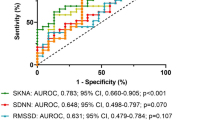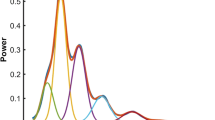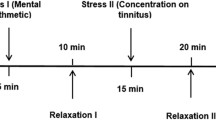Abstract
Anxiety and abnormal upper esophageal sphincter function have been ascribed ill- defined roles in the etiology of globus sensation. In this study, we examined the psychological profile and effect of acute mental stress (dichotic listening task) on UES tone in seven patients reporting to the clinic with globus sensation and 13 healthy controls. Alterations in heart rate, blood pressure, frontalis EMG, and skin conductance confirmed the effectiveness of the stress test in patients and controls. During resting conditions, UES pressure (mean±SE) in patients (40.4±4.6 mm Hg) did not differ significantly from controls (46.5±4.7 mm Hg). In response to stress, UES pressure rose by 31% in patients (P=0.04) and by 25% in controls (P=0.002). The stress- induced rise in UES pressure in patients (9.5±3.8 mm Hg) was not significantly different to that observed in controls (11.8±3.0 mm Hg). Psychological profiles of globus patients presenting to the clinic revealed them to be more introverted, anxious, neurotic, and depressed than normal controls. We conclude that in patients with a history of globus sensation, resting UES pressure and its response to stress is normal. Although individuals presenting to the clinic with globus sensation showed increased levels of psychoneurosis, acute, predictable stress is not a factor in the genesis of globus sensation. UES hyperresponsiveness to other stimuli or subjective intolerance to changes in UES pressure could account for symptoms of globus sensation.
Similar content being viewed by others
References
Thompson WG, Heaton KW: Heartburn and globus in apparently healthy people. Can Med Assoc J 126:46–48, 1982
Glaser JP, Engel GL: Psychodynamics, psychophysiology and gastrointestinal symptomatology. Clin Gastroenterol 6: 507–531, 1977
Watson WC, Sullivan SN: Hypertonicity of the cricopharyngealsphincter: A cause of globus sensation. Lancet 2:1417–1419, 1974
Caldarelli DD, Andrews AH, Derbyshire AJ: Esophageal motility studies in globus sensation. Ann Otol Rhinol Laryngol 79:1098–1100, 1970
Cook IJ, Dent J, Collins SM: Measurement of upper esophageal sphincter pressure: Effect of acute emotional stress. Gastroenterology 93:526–532, 1987
Kahrilas PJ, Dent J, Dodds WJ, Hogan WJ, Arndorfer RC: A method for continuous monitoring of upper esophageal sphincter pressure. Dig Dis Sci 32:121–128, 1987
Eysenck HJ, Eysenck SBG: Educational and industrial testing service, San Diego, California 1975
Speilberger CD, Gorsuch RL, Lushene R: Consulting psychologists. Palo Alto, California, 1970
Beck AT, Ward CH, Mendelson M, Mock J, Erbaugh J: An inventory for measuring depression. Arch Gen Psychiatry 4:561–571, 1961
Bruning JL, Kintz BL: Computational Handbook of Statistics, 2nd ed. Glenview, IL, Scott, Foresman, 1977, pp 44–48
Hunt PS, Connell AZM, Smiley TB: The cricopharyngeal sphincter in gastric reflux. Gut 11:303–306, 1970
Gerhardt DC, Shuck TM, Bordeaux RA, Winship DH: Human upper esophageal sphincter response to volume, osmotic and acid stimuli. Gastroenterology 75:268–274, 1978
Freiman JM, El-Sharkaway T, Diamant NE: Effect of bilateral vagosympathetic nerve blockade on response of the dog upper esophageal sphincter (UES) to intraesophageal distension and acid. Gastroenterology 81:78–84, 1981
Schatski R. Globus hystericus (globus sensation). N Engl J Med 270:676, 1964
Welch RW, Luckman K, Ricks PM, Drake ST, Gates GA: Manometry of the normal upper esophageal sphincter and its alterations in laryngectomy. J Clin Invest 63:1036–1041, 1979
Isberg A, Nilsson ME, Schiratzki H: Movement of the upper esophageal sphincter and a manometric device during deglutition. Acta Radiol Diag 26:381–388, 1985
Hellemans J, Agg HO, Pelemans W, Vantrappen G: Pharyngoeosphageal swallowing disorders and the pharyngoesophageal sphincter. Med Clin North Am 65 (6):1149–1171, 1981
Whitehead WE, Bosmajian L, Zonderman A, Costa P, Schuster MM: Role of psychological symptoms in irritable bowel syndrome. Comparison of community and clinic samples. Gastroenterology 92:1963, 1987
Author information
Authors and Affiliations
Additional information
Dr. Cook is supported by a University of Sydney, Postgraduate Medical Foundation Award. Dr. Dent was supported as a Visiting Professor to McMaster University by a Visiting Scientist Award from the Canadian Medical Research Council.
Rights and permissions
About this article
Cite this article
Cook, I.J., Dent, J. & Collins, S.M. Upper esophageal sphincter tone and reactivity to stress in patients with a history of globus sensation. Digest Dis Sci 34, 672–676 (1989). https://doi.org/10.1007/BF01540336
Received:
Revised:
Accepted:
Issue Date:
DOI: https://doi.org/10.1007/BF01540336




